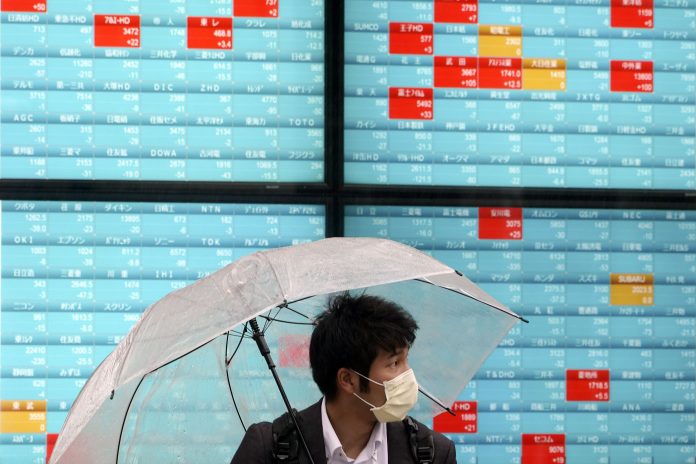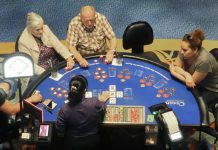
Stocks moved mostly higher on Wall Street Tuesday as investors reviewed earnings reports from big companies and welcomed signs that government officials are considering how to gradually reopen the economy.
President Donald Trump has been discussing with senior aides how to roll back federal social distancing recommendations that expire at the end of the month. And governors around the U.S. have begun collaborating on plans to reopen their economies in what is likely to be a drawn-out, step-by-step process to prevent the coronavirus from rebounding with disastrous results.
The discussions follow some signs that the outbreak may be leveling off in some of the hardest-hit areas. In Italy, Spain and other places around Europe where infections and deaths have begun stabilizing, the process of reopening the economy is already underway, with certain businesses and industries allowed to reopen in a calibrated effort aimed at balancing public health against their countries’ economic well-being.
“Wall Street is encouraged simply by the conversation of a reopening of the economy,” said Sam Stovall, chief investment strategist, CFRA.
The S&P 500 was up 3% as of 2:56 p.m. Eastern time, recovering all of its losses from a day earlier. The benchmark index surged 12% last week, though it remains about 16% below its all-time high set in February. The Dow Jones Industrial Average moved 543 points higher, or 2.3%, to 23,930. The Nasdaq climbed 4%.
Technology stocks powered much of the rally. Microsoft climbed 4.9% and Apple rose 5.3%.
Johnson & Johnson climbed 4.8% after reporting a stronger profit for the first three months of the year than Wall Street expected. It also raised its dividend, bucking a broader trend as companies try to conserve cash.
JPMorgan Chase and Wells Fargo led bank stocks lower after reporting disappointing results. Both banks set aside large amounts of reserves as they girded for losses on loans going unpaid as millions of Americans became unemployed due to the coronavirus pandemic.
Tentative optimism that the outbreak has begun to plateau in some areas plus unprecedented infusions of support from the Federal Reserve and the government have helped drive stocks higher this month. But this week stocks could be in for more volatility as companies serve up their first-quarter results.
While Wall Street expects profits will be down for most companies in the S&P 500, the focus is on what management teams have to say about what their prospects for profits look like for the rest of the year. That might prove difficult. With all the uncertainties about when economies may reopen, many companies have simply pulled their profit and sales forecasts for the year altogether.
Given how big and unprecedented the coronavirus shock to the economy has been, analysts are struggling to guess how bad corporate earnings will get hit. At Deutsche Bank, Chief Global Strategist Binky Chadha said his usual methods of forecasting earnings based on economic growth or surveys measuring business activity “are essentially broken.”
“It’s incredibly hard during normal times to have an economic forecast, but today, you’re kind of flying blind,” said Brent Schutte, chief investment strategist at Northwestern Mutual Wealth Management. “What companies have to say will be incredibly important.”
Across Wall Street, analysts are forecasting a drop of roughly 10% in earnings per share for S&P 500 companies for the first quarter and 21% for the second quarter.
It’s going to be a tough couple of quarters for corporate America as the economy will likely take “two steps forward and one step back” as it recovers, said Jeff Buchbinder, equity strategist for LPL Financial.
“We know this is going to be one of the most severe recessions we have ever seen,” he said, adding that right now, there is still too much uncertainty and there may be too much optimism in the market.
Apart from earnings, investors continue to keep an eye on the COVID-19 case data for clues as to whether the outbreak will wane enough for government officials to relax the social distancing guidelines and business closures that have left a record number of Americans suddenly unemployed.
There are more than 1.94 million confirmed coronavirus cases worldwide, led by the United States with more than 583,000, according to a tally by Johns Hopkins University.
The economic damage from the outbreak has been widespread and severe after only a few weeks into the shutdown. The International Monetary Fund said Tuesday that the world economy will suffer its worst year since the Great Depression.
Bond prices were little changed. The yield on the 10-year Treasury held steady at 0.75%.
Oil prices fell sharply, despite an agreement reached over the weekend by OPEC, Russia and other oil producing nations to cut output starting May 1 by nearly 10 million barrels a day, or a tenth of daily global supply. Benchmark U.S. crude fell $2.30, or 10.3%, to settle at $20.11 a barrel. Brent, the international standard, dropped $2.14 to close at $29.60 a barrel.
European markets mostly rose after reopening following a holiday. Asian markets ended mostly higher.
















